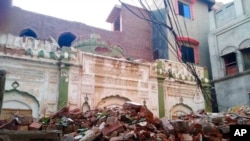Unknown attackers in central Pakistan shot and killed a member of the minority Ahmadi community Saturday amid an uptick in violence, against what critics describe as the country’s long-persecuted group.
The targeted shooting occurred in the Gujarat district in Punjab, the country’s most populous province, area police officials reported. They identified the victim as 53-year-old Zaka ur Rehman, a practicing dentist, saying the assailants fled the scene.
Witnesses reported to police that two gunmen on a motorbike arrived at Rehman’s clinic, with one of them firing multiple shots at him from close range, said Amir Mehmood, a spokesperson for the minority community. He demanded that Pakistani authorities swiftly arrest the culprits and bring them to justice.
Rehman is the fourth Ahmadi killed in Punjab and the country as a whole this year.
Saturday’s attack came two days after a United Nations panel of independent experts denounced the spike in attacks against members of Pakistan’s minority Ahmadi community and their places of worship.
“We are alarmed by ongoing reports of violence and discrimination against the Ahmadiyya community in Pakistan. We urge Pakistani authorities to take immediate action to address this situation,” the experts, reporting to the Geneva-based U.N. Human Rights Council, said in a statement Thursday.
Ahmadis are followers of the Ahmadiyya community, a contemporary messianic movement founded in 1889, and they profess to be Muslims.
The U.N. experts highlighted the killings of several Ahmadis in recent weeks and expressed concern over allegations of arbitrary arrests and detentions of worshippers from the community to keep them from participating in their religious rituals.
“Urgent measures are necessary to respond to these violent attacks and the broader atmosphere of hatred and discrimination which feeds it,” the panel stated.
No group has lately claimed responsibility for targeting Ahmadis, but their representatives blame Tehreek-e-Labaik Pakistan, or TLP, a far-right Islamist political party, for inciting followers to attack members and places of worship of the minority community.
TLP leaders routinely use offensive anti-Ahmadi language in rallies and gatherings.
Pakistan’s parliament declared Ahmadis non-Muslim in 1974 and subsequently prohibited them from "indirectly or directly posing as Muslims.” The minority sect is also barred from declaring or propagating its faith publicly and building places of worship in the country.
The legislative restrictions are blamed for the rise in violence against Ahmadis. Domestic and international human rights groups have persistently criticized Pakistan for not doing enough to deter crimes against members of its religious minorities, including Christians.




